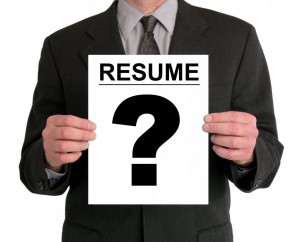14 reasons why your CV is going in the TRASH CAN !

Vidhan Chandra, co-founder and director of iSource Services, a recruiting and executive search portal tells you why you must avoid making these mistakes in your CV.
A well written and presented CV will help you clinch that dream job interview.
Avoiding some of these potentially damaging mistakes can increase your chances of being hired.
1. Avoid writing CV/Resume on top
We all know it is your resume, never write it.
It may sound funny but 55 to 60 percent of applicants commit this horror.
Avoid it. Instead, write your name in bold.
The ideal font would be Arial, size 20.
2. All-caps
In written communication, all caps is used to over-emphasise or highlight something.
In the case of a resume, text in all caps is downright rude. The golden rule is to avoid using it.
Even if it means writing your name, a sub heading, a company’s name, your institute or designation, use title case for emphasis.
At the same, not using capital letters at the appropriate places is equally thoughtless For e.g. VP is not the same as Vp or HR Manager is not the same as Hr Manager.
While using abbreviations or names of institutes, never write Iit in place of IIT. Rather spell it out as Indian Institute of Technology.
Use your mind, put in a thought why you are writing what you are writing.
3. Unnecessary details
There are candidates who mention their entire family history replete with names of their father, mother, spouse and children.
And then there are those who add the occupation of their father, mother and in some cases their children’s age and sibling’s occupation.
Frankly, who is interested?
Obviously the HR manager is not.
Your CV is not aimed at verifying your marriage suitability.
4. Vital statistics
In case, you thought the earlier point was irrelevant, here’s more.
We have candidates who add details of their caste, religion, height and weight.
The HR manager is clearly not looking to recruit you for join politics and unless you are applying for specific profiles like model, television presenter, cabin crew or receptionist, details like height, weight and colour are least important.
By writing these one indirectly presents a mindset which is regressive. It is advisable to avoid these blunders at all cost.
5. Contact clutter
Simply because one has to furnish their address and contact, it is not important to add details like present address, permanent address and multiple phone numbers.
Keep it simple and add one local address, one phone number (working) and e-mail id.
That would be more than sufficient.
6. Spelling mistakes
The surest way to mar your chances to get that dream job is by sending a CV without running a spell check.
Honestly, there is no valid explanation as to why a potential candidate would not use the Spell Check feature which is built in your word processor.
A CV with spelling errors shows your laziness or incompetence.
Get your resume vetted by someone other than you — a colleague or a friend.
Another way is to read it at least 3-4 times before you print or upload it online.
Each time you run through your CV, you are sure to be surprised.
7. Bad formatting
A badly formatted CV can have the same disastrous effect as one with spelling errors.
Avoid long paragraphs and haphazard layout.
Check for improper use of blank spaces, tabs and margins.
Use bold, italics and underline to highlight keywords.
Your information has to flow in a seamless manner, so plan it out well.
Lack of bullets can be a major turn off especially while stating achievements.
Also double check before you print and upload it online to see if the changes you made are reflecting.
8. Using too many abbreviations
Don’t assume the recruiter to know it all.
Avoid abbreviations, spell it out.
What comes naturally to you may not be perceived the same way by HR professionals.
It is okay to use domain specific abbreviations, or well accepted brand names or entities as abbreviations but using it at all the places is not the best way forward.
For example, ISB could mean Indian School of Business, Institute of Systems Biology or even International Society of Bassists.
9. Avoid SMS language
With the advent of SMS and chat, people fail to realise that they are writing a resume and not a personal message to their friend.
Using SMS language is a good way to ensure your rejection.
Do not, I repeat do not use them, EVER.
Some common words you can avoid using in a CV are ‘thru’ instead of ‘through’, & for ‘and’, ‘ur’ for Your and ‘m’ for I am etc.
10. Vague achievements
You may have stood first in a lemon and spoon event at kindergarten, but would you put it on a CV?
Best of all, there are those who mention their KRAs and job description under achievements.
Either you don’t understand the meaning of the word achievement or you are simply overdoing it.
Your job description is not an achievement, but will aptly appear under responsibilities or work experience.
Your KRAs are also part of your job, so never mention your regular deliverables as achievements unless you have achieved something significant and can validate the same if need be.
For example, if you are in sales, sales or marketing cannot be your achievement.
But if you’ve acquired a huge client or achieved highest sales for a particular quarter/month etc, that can be listed under achievement.
Ensure you have supporting figures to back your (achievement) claims.
11. Superlatives
As a potential candidate it is obvious to use expressions like ‘I am very good at this…..’ or using sentences like excellent in communication, Out achiever in ….., I am extraordinary at …
I’d advice let the recruiter or the interviewer make that call.
12. Job irrelevance
It is important to prepare a CV that matches the job description you are applying for.
Why are you preparing your resume? What purpose is it going to serve?
One resume fits all is a belief that keeps good candidates from getting hired.
Remember you need to tailor your resume for each opening.
13. Avoid jargons
Using fancy words is a big turnoff.
Keep your choice of words and sentence formation simple and clear.
Your CV has to be clear, concise and easy to read.
14. Keywords, not hyperbole
Words like dynamic , out-achiever, self-starter, effective, seasoned, out-standing, driven, excellent in communication, exceptional, hard working, result oriented, result driven, motivated, etc are beaten to death.
The less you use these words, the better.
Instead focus on keywords like sales, marketing, networking, communication to make it work for you.
This article originally appeared on Rediff.com authored by Vidhan Chandra.
About the author:
Vidhan is an entrepreneur and passionate about technology and its impact on human evolution. He is the founder of iSource Services & Resume Builder. Vidhan has over the years been a speaker at various universities and corporate events and specialises in delivering lectures and talks related to career development, staffing, resume writing and job related insights. An avid reader, he enjoys reading corporate strategy, current affairs, politics and sociology. Vidhan is an alumnus of XLRI, Jamshedpur’s Post Graduate Business Management Program.
Reach him on LinkedIn , Google+ , Twitter
 If you have ever been looking for a job the first question comes to mind “How can I stand apart my experience from crowd?” Your ability to transfer learning to actual demonstrates your skills and knowledge. Remember first impression counts, and the first impression that a potential employer will have of you, is going to depend on how you present your resume.
If you have ever been looking for a job the first question comes to mind “How can I stand apart my experience from crowd?” Your ability to transfer learning to actual demonstrates your skills and knowledge. Remember first impression counts, and the first impression that a potential employer will have of you, is going to depend on how you present your resume.







